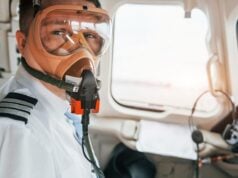
“Good leadership consists of motivating people to their highest levels by offering them opportunities, not obligations.” – Lao Tzu, Chinese philosopher
A gradient can be thought of as a slope, a non-linear surface. Translated to the flight deck, often the level of experience among crew members is not linear and varies significantly. For soon-to-be captains, the goal is to maintain what I refer to as a “positive intra-cockpit gradient.”
A positive cockpit gradient is critical to preserving the captain’s leadership. If you’re the captain and you have a negative cockpit gradient, your first officer is running the show; meaning you have become a follower – not ideal when your role is leader of the team.
It is not uncommon to have an unbalanced gradient. Experienced captains flying with new-hire first officers will result in a steeper, leader-focused, gradient. On the contrary, a senior first officer with more flight time than the captain on the equipment, would denote a shallower gradient.
It is paramount to acknowledge both shallower and steeper gradients can still be positive. Positive meaning, that you as the PIC maintain the leadership role at all times. Think of it as finding a balance. The extreme of a steep gradient consists of an “authoritative” style. Such leaders make decisions independently and degrade CRM – a manner most flight-crew professionals resent. Equally as detrimental are the extremes of the shallow gradient, where the experienced first officer executes tasks and duties with minimal input from you or makes decisions on their own. This is not ideal either, given that you have just deferred your responsibility to others. This is known as the “delegative” style.
The challenge (and hopefully a skill you will learn) is knowing when and how to exercise an appropriate level of authority. Or, per this article, knowing when to adjust the gradient scale. For example, non-normal emergencies and time-critical scenarios will require the PIC to step up. The PIC will have to make decisions, assess risk, and manage flight-deck workload. Naturally, the gradient will be steepened – AS IT SHOULD! Direct and blunt verbal tone and style may be necessary in circumstances where time and options are limited. Without a more “authoritative” approach, it may not be possible to manage a deteriorating situation from further degradation. Simply put, be flexible.
If you don’t want to be authoritarian or delegative, what are you striving for? A participative style is when the leader is clearly defined at all times and preserves final authority but accepts input from the followers. This style is the best to promote effective CRM and fosters a learning environment. Think of it as the perfectly balanced scale in an ideal world. Keep in mind, even with uneven experience levels (shallower/steeper gradients), you can still achieve a positive intra-cockpit outcome.
Embarking on the journey to become a captain is the goal to which most professional pilots aspire. Be the captain, think like the captain, and remember — keep a positive cockpit gradient!
“Good leadership consists of motivating people to their highest levels by offering them opportunities, not obligations.” – Lao Tzu, Chinese philosopher























































































































